Sports
The Economics of Sports: Financial Dynamics of Professional Leagues and Teams
The Economics of Sports – Financial Dynamics of Professional Leagues and Teams
Have you ever wondered what goes on behind the scenes in the multi-billion dollar world of professional sports? How do teams operate, generate revenue, and distribute profits?
What are the economic forces that shape the landscape of professional leagues?
If you’re a sports fan, or simply curious about the business of sports, this article is for you. We’ll dive deep into the fascinating world of sports economics, demystifying the financial dynamics that govern professional leagues and teams.
Understanding the Sports Industry Ecosystem
The sports industry encompasses a vast ecosystem of stakeholders, each playing a crucial role in generating revenue and driving economic activity.
From players and coaches to league officials, stadium owners, and media companies, countless individuals and entities contribute to the financial success of professional sports.
Key Revenue Streams for Sports Teams and Leagues:
- Ticket Sales: Revenue generated from ticket sales forms the foundation of most sports teams’ income. Factors like team performance, venue capacity, and ticket prices all influence ticket sales revenue.
- Media Rights: Broadcast contracts with television networks and streaming services provide a significant source of revenue for both teams and leagues. Exclusive media rights deals can generate billions of dollars per year.
- Merchandise Sales: Apparel, jerseys, memorabilia, and other branded merchandise contribute significantly to teams’ revenue, capitalizing on fans’ loyalty and desire to show their support.
- Stadium Naming Rights and Sponsorships: Companies pay hefty sums to secure naming rights for stadiums and arenas, as well as sponsorship deals that grant them branding and marketing opportunities within the sports industry.
- Luxury Suites and Premium Seating: Offering premium seating options with exclusive amenities and services allows teams to generate higher revenue from dedicated fans and corporate clients.
How Sports Teams Allocate Their Resources:
Sports teams face the constant challenge of allocating their resources efficiently to achieve success on the field and maximize profitability. Key expenditure areas include:
- Player Salaries and Benefits: Player salaries represent the largest expense for most teams, with star athletes commanding multi-million dollar contracts.
- Coaching Staff and Management: Teams invest in skilled coaches, trainers, and management personnel to optimize player development and performance.
- Facility Maintenance and Operations: Upkeep of stadiums, training facilities, and other infrastructure requires significant financial resources.
- Travel and Expenses: Teams incur travel expenses for away games, training camps, and other team-related activities.
- Marketing and Advertising: Teams invest in promotional campaigns to build their brand, attract fans, and boost merchandise sales.
Economic Challenges and Opportunities:
The sports industry faces several economic challenges, including:
- Rising Player Salaries: The escalating cost of acquiring and retaining top talent puts pressure on teams’ finances.
- Competition from Other Entertainment Options: Fans have a wider range of entertainment options than ever before, necessitating innovation and engagement strategies to attract and retain fans’ attention.
- Global Economic Downturns: Economic recessions can negatively impact fan spending and sponsorship revenue.
Despite these challenges, the sports industry also presents exciting opportunities for economic growth:
- Expansion into New Markets: Professional leagues and teams are constantly looking to expand their reach into new markets, both domestically and internationally.
- Growth of Digital Media: The rise of digital platforms and social media creates new avenues for fan engagement and revenue generation.
- Emerging Technologies: Technologies like virtual reality and augmented reality offer innovative ways to enhance the fan experience and generate revenue.
The Impact of Sports on the Economy:
The sports industry plays a significant role in the overall economy by:
- Creating Jobs: The industry employs millions of people directly and indirectly, contributing to job creation across diverse sectors.
- Generating Tax Revenue: Teams and leagues contribute billions of dollars in tax revenue to local, state, and federal governments.
- Boosting Tourism: Major sporting events attract tourists from around the world, generating revenue for hotels, restaurants, and other businesses.
How Sports Teams Utilize Data Analytics to Gain a Competitive Edge
In the highly competitive world of professional sports, every advantage counts.
In recent years, data analytics has emerged as a powerful tool for teams to gain a strategic edge on the field, improve player performance, and optimize their business operations.
Here’s how data analytics is revolutionizing the sports industry:
1. Player Performance Analysis:
- Tracking player movement and biomechanical data: Sensors and wearable technology provide insights into movement patterns, fatigue levels, and potential injury risks.
- Analyzing game footage: Teams use video analysis to identify individual and team strengths and weaknesses,refine play calling, and develop scouting reports on opponents.
- Predicting player performance: Statistical models help predict player performance based on past performance, training data, and opponent analysis.
2. Team Strategy and Decision Making:
- Identifying optimal lineups and formations: Data analysis helps coaches determine the most effective player combinations based on their strengths and weaknesses.
- Scouting and analyzing opponents: Teams use data to identify opponent tendencies, predict plays, and develop game-specific strategies.
- Real-time adjustments: During games, data analysis allows coaches to make real-time adjustments based on player performance and game situations.
3. Player Development and Training:
- Personalized training programs: Data analysis helps coaches tailor training programs to individual players’ specific needs and weaknesses.
- Injury prevention: Data can identify potential injury risks and help develop preventive measures to keep players healthy.
- Optimizing training intensity: Data helps coaches determine the optimal training intensity for each player to maximize performance while minimizing fatigue and injury risks.
4. Business Operations and Revenue Generation:
- Dynamic ticket pricing: Teams use data to determine optimal ticket prices based on demand, opponent, and other factors.
- Fan engagement and marketing: Data helps teams understand their fan base and develop targeted marketing campaigns to increase engagement and revenue.
- Sponsorship opportunities: Data analysis helps teams identify and secure lucrative sponsorship deals based on brand alignment and fan demographics.
5. The Future of Data Analytics in Sports:
The use of data analytics in sports is rapidly evolving, with new technologies and applications emerging all the time. Some exciting future developments include:
- Artificial intelligence (AI) for player analysis: AI-powered systems will analyze player movement and performance with greater accuracy and provide real-time feedback to coaches and players.
- Predictive analytics for injuries and player health: Advanced data models will predict player injury risks with even greater certainty, allowing for preventative measures and personalized rehabilitation plans.
- Personalized fan experiences: Data will be used to personalize the fan experience at stadiums and through digital platforms, creating deeper engagement and loyalty.
By embracing data analytics, sports teams are gaining unprecedented insights into player performance, team dynamics, and fan behavior.
As technology continues to evolve, data analytics will play an even more critical role in driving success both on and off the field.
Conclusion:
The economics of sports is a complex and dynamic field, shaped by various stakeholders and influenced by economic trends and technological advancements. Understanding these dynamics is crucial for anyone interested in the inner workings of professional sports, whether as a fan, player, or business professional.
Frequently Asked Questions:
What are some of the major factors that influence ticket prices for sporting events?
Ticket prices are influenced by several factors, including:
- Team popularity and performance: Tickets for teams with strong fan bases and winning records typically command higher prices.
- Opponent popularity: Games against high-profile or rival teams often have higher ticket prices.
- Seat location: Seats closer to the field or with premium amenities usually cost more.
- Demand and supply: Prices may fluctuate based on the available tickets and the number of fans interested in attending.
Stay tuned as we explore the fascinating world of Sports Analytics in greater detail in upcoming articles.
Facts Check
Get accurate sports & game news, delivered with fairness. Contribute or advertise? Reach out! Spot something amiss? Contact us.
Latest Sports News
Top 16 Fastest Soccer Players Ever: Discover the Speed Demons of the Game
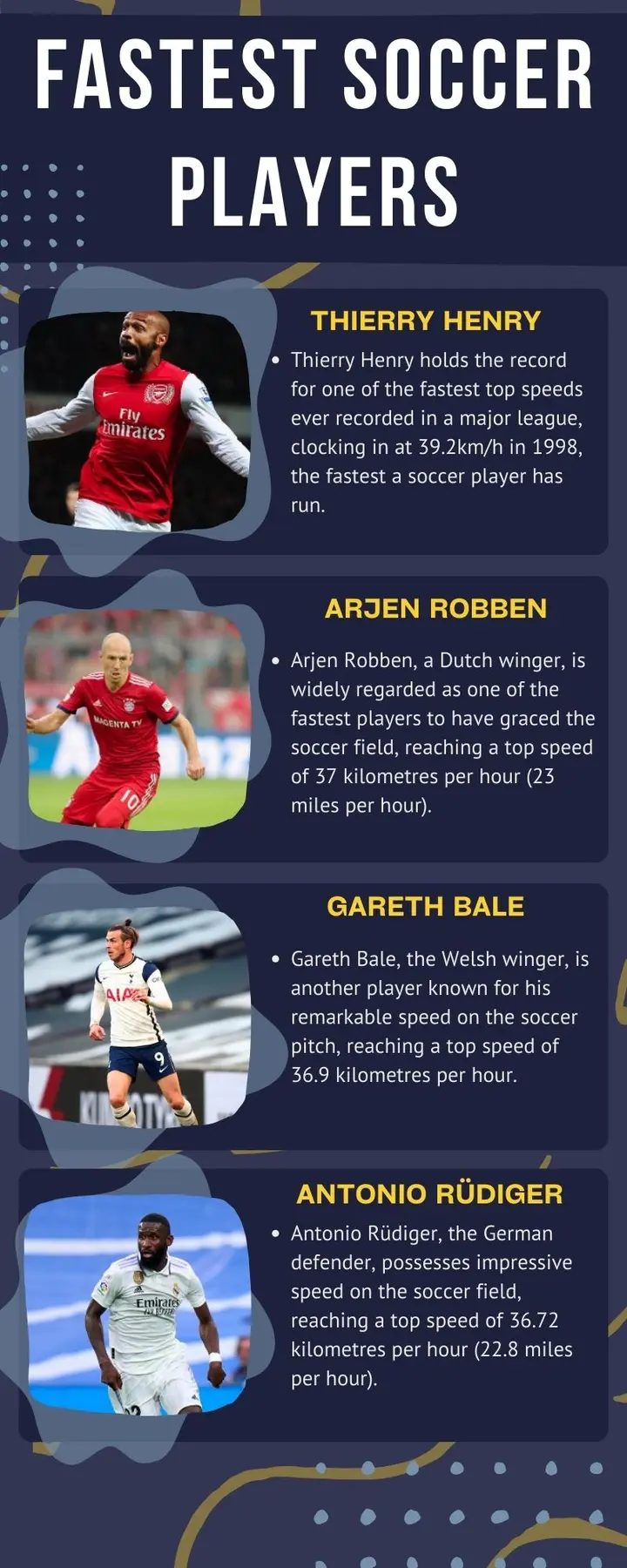
The quest for speed in soccer has always captivated fans and players. In the world of football, certain players are celebrated for their lightning-fast pace, setting remarkable speed records.
When we talk about the fastest soccer players ever, these elite athletes stand out for their extraordinary velocity and agility.
The 16 Fastest Soccer Players of All Time
Soccer history is filled with players who have demonstrated phenomenal speed on the field. Their incredible pace and technical skills have earned them legendary status.
Let’s dive into the list of the top 16 fastest soccer players and uncover who holds the title for the most blazing speed.
16. Cristiano Ronaldo – 33.95 km/h

- Full name: Cristiano Ronaldo dos Santos Aveiro
- Date of birth: 5 February 1985
- Age: 39 years (as of 2024)
- Place of birth: Hospital Dr. Nélio Mendonça, Funchal, Portugal
Cristiano Ronaldo, a name synonymous with elite soccer, clocks in at a remarkable 33.95 km/h. Known for his explosive acceleration, Ronaldo has dazzled fans with his speed throughout his career with clubs like Manchester United and Real Madrid.
His ability to burst past defenders has made him one of the top fastest soccer players ever.
15. Antonio Valencia – 35.1 km/h
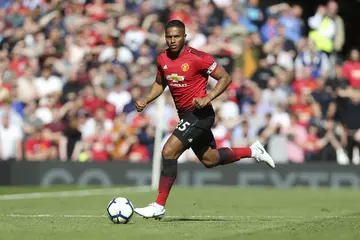
- Full name: Luis Antonio Valencia Mosquera
- Date of birth: 4 August 1985
- Age: 38 years (as of 2024)
- Place of birth: Nueva Loja, Ecuador
Antonio Valencia, the Ecuadorian winger, has been a notable figure in soccer for his incredible speed. With a top speed of 35.1 km/h, Valencia’s sprinting ability has been a crucial asset in both offensive and defensive situations.
His speed was particularly evident during his time at Manchester United, where he became renowned for his rapid runs down the wing.
14. Leroy Sané – 35.9 km/h
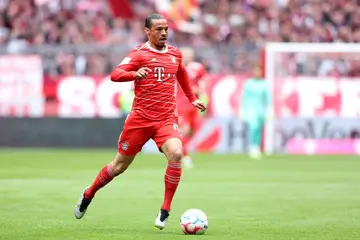
- Full name: Leroy Aziz Sané
- Date of birth: 11 January 1996
- Age: 28 years (as of 2024)
- Place of birth: Essen, Germany
Leroy Sané’s 35.9 km/h speed is a testament to his exceptional agility and acceleration. The German winger, known for his time at FC Bayern München, consistently leaves defenders in the dust.
His rapid pace allows him to create significant scoring opportunities, making him one of the most exciting players to watch.
13. Kylian Mbappé – 36 km/h

- Full name: Kylian Mbappé
- Date of birth: 20 December 1998
- Age: 25 years (as of 2024)
- Place of birth: 19th arrondissement, Paris, France
The French sensation Kylian Mbappé has taken the soccer world by storm with his astounding 36 km/h speed. Known for his blistering acceleration, Mbappé can outpace virtually any defender.
His ability to maintain such high speed over distances is a key factor in his success and reputation as one of the top fastest soccer players.
12. Ronaldo Nazário – 36.2 km/h
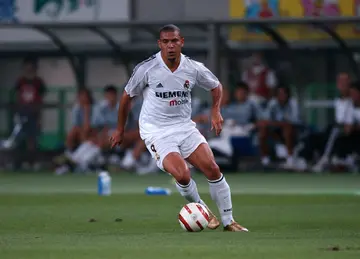
- Full name: Ronaldo Luís Nazário de Lima
- Date of birth: 18 September 1976
- Age: 47 years (as of 2024)
- Place of birth: Rio de Janeiro, State of Rio de Janeiro, Brazil
Ronaldo Nazário, often referred to as “El Fenomeno,” was renowned for his speed and skill. With a top speed of 36.2 km/h, the Brazilian legend’s rapid bursts left defenders struggling to keep up.
His exceptional speed, combined with his technical prowess, made him one of the most formidable attackers of his era.
11. Mohamed Salah – 36.64 km/h
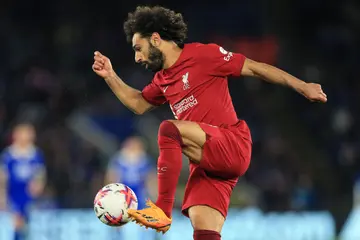
- Full name: Mohamed Salah Hamed Mahrous Ghaly
- Date of birth: 15 June 1992
- Age: 31 years (as of 2024)
- Place of birth: Nagrig, Egypt
Mohamed Salah, the Egyptian forward for Liverpool, has reached an impressive speed of 36.64 km/h. His electrifying pace is a vital component of his attacking game, allowing him to outrun defenders and capitalize on scoring opportunities.
Salah’s speed and technical ability make him a constant threat on the field.
10. Antonio Rüdiger – 36.72 km/h
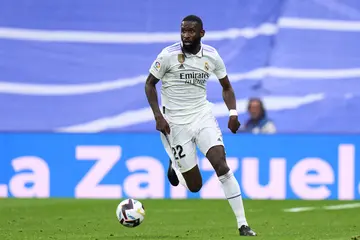
- Full name: Antonio Rüdiger
- Date of birth: 3 March 1993
- Age: 31 years (as of 2024)
- Place of birth: Berlin, Germany
Antonio Rüdiger, a German defender, showcases his impressive speed with a top speed of 36.72 km/h. His ability to accelerate quickly and cover ground efficiently has made him a valuable player for both Real Madrid and the German national team.
Rüdiger’s speed enhances his defensive capabilities, making him a key asset in crucial situations.
9. Dara O’Shea – 36.73 km/h

- Full name: Dara Joseph O’Shea
- Date of birth:4 March 1999
- Age: 25 years (as of 2024)
- Place of birth: Dublin, Ireland
Dara O’Shea, a defender for Burnley and the Republic of Ireland, boasts a top speed of 36.73 km/h. His speed allows him to keep pace with some of the Premier League’s most dynamic attackers.
O’Shea’s quickness and defensive skills have established him as a rising star in soccer.
8. Dominik Szoboszlai – 36.76 km/h
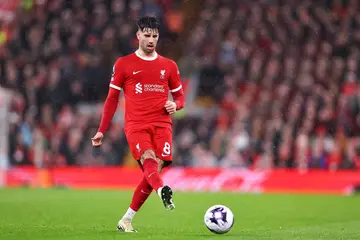
- Full name: Dominik Szoboszlai
- Date of birth: 25 October 2000
- Age: 23 years (as of 2024)
- Place of birth: Székesfehérvár, Hungary
Hungarian midfielder Dominik Szoboszlai reaches a top speed of 36.76 km/h. Playing for Liverpool and captaining the Hungarian national team, Szoboszlai’s speed is a significant asset in his versatile midfield role.
His quick bursts and agility are critical to his performance on the field.
7. Pedro Neto – 36.86 km/h

- Full name: Pedro Lomba Neto
- Date of birth: 9 March 2000
- Age: 24 years (as of 2024)
- Place of birth: Viana do Castelo, Portugal
Pedro Neto, the Portuguese winger for Wolverhampton Wanderers, has a top speed of 36.86 km/h.
Known for his rapid pace and dynamic play, Neto’s speed is a key factor in his ability to disrupt defenses and create scoring chances.
6. Gareth Bale – 36.9 km/h
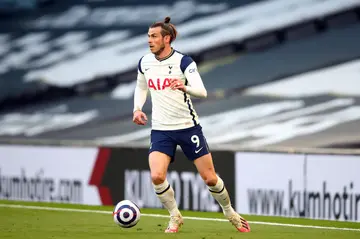
- Full name: Gareth Frank Bale
- Date of birth: 16 July 1989
- Age: 34 years (as of 2024)
- Place of birth: Cardiff, United Kingdom
Gareth Bale, the Welsh winger, achieved a top speed of 36.9 km/h. His speed has been a defining feature of his career, particularly during his time with Tottenham Hotspur and Real Madrid.
Bale’s explosive acceleration and rapid runs make him one of the fastest soccer players in history.
5. Chiedozie Ogbene – 36.93 km/h

- Full name: Chiedozie Somkelechukwu Ogbene
- Date of birth: 1 May 1997
- Age: 26 years (as of 2024)
- Place of birth: Lagos, Nigeria
Chiedozie Ogbene, known for his impressive 36.93 km/h speed, has made a name for himself with his blistering pace.
His ability to cover ground quickly and maintain high velocity makes him a standout player on the field.
4. Arjen Robben – 37 km/h
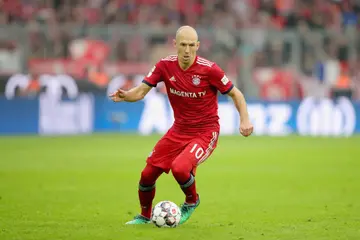
- Full name: Arjen Robben
- Date of birth: 23 January 1984
- Age: 40 years (as of 2024)
- Place of birth: Bedum, Netherlands
Arjen Robben, the Dutch winger, reached a remarkable top speed of 37 km/h. His incredible pace, combined with his technical skills, allowed him to be a constant threat to defenders.
Robben’s speed was a key factor in his success with clubs like Bayern Munich.
3. Kyle Walker – 37.31 km/h
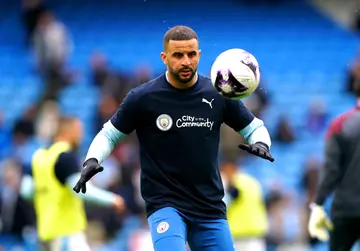
- Full name: Kyle Andrew Walker
- Date of birth: 28 May 1990
- Age: 33 years (as of 2024)
- Place of birth: Sheffield, United Kingdom
Kyle Walker, the English right-back, is known for his top speed of 37.31 km/h.
His ability to cover ground quickly and his defensive prowess make him a valuable player for both Manchester City and the England national team.
2. Micky van de Ven – 37.38 km/h

- Full name: Micky van de Ven
- Date of birth: 19 April 2001
- Age: 22 years (as of 2024)
- Place of birth: Wormer, Netherlands
Micky van de Ven, a Dutch defender, achieves an impressive speed of 37.38 km/h. His rapid pace and defensive skills make him a standout player in the sport.
Van de Ven’s speed is a significant asset in his role as a defender.
1. Thierry Henry – 39.2 km/h
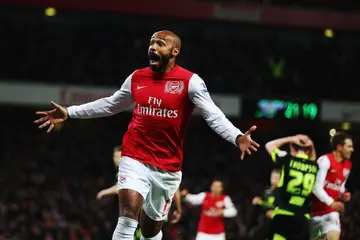
- Full name: Thierry Daniel Henry
- Date of birth: 17 August 1977
- Age: 46 years (as of 2024)
- Place of birth: Les Ulis, France
Thierry Henry, the French legend, holds the top spot with a phenomenal 39.2 km/h speed. Known for his explosive acceleration and incredible pace, Henry’s speed was a key factor in his success with Arsenal and other top clubs.
His ability to outpace defenders and create scoring opportunities solidifies his place as the fastest soccer player ever.
Conclusion
In the world of soccer, speed is a game-changer. The fastest soccer players not only entertain us with their breathtaking pace but also redefine the dynamics of the game.
From Cristiano Ronaldo’s explosive runs to Thierry Henry’s unmatched speed, these athletes have left an indelible mark on soccer history with their incredible velocity.
FAQs
1. Who is the fastest soccer player ever?
Thierry Henry holds the title of the fastest soccer player ever with a top speed of 39.2 km/h.
2. How fast is Kylian Mbappé?
Kylian Mbappé reaches a top speed of 36 km/h.
3. What is Cristiano Ronaldo’s top speed?
Cristiano Ronaldo’s top speed is 33.95 km/h.
Blog
“Real Madrid 2024-25: Mbappe’s Arrival Heralds New Era of Galácticos”

Real Madrid, the reigning European and Spanish champions, are poised to reach new heights in the 2024-25 season with the long-awaited arrival of French superstar Kylian Mbappe. The addition of the world-class forward to an already formidable squad has sent shockwaves through the footballing world and ignited fervent excitement among the Madridistas.
Carlo Ancelotti’s men, fresh off a historic Champions League and La Liga double, have somehow managed to strengthen their ranks further. The acquisition of Mbappe, widely regarded as one of the top three players globally, promises to elevate Los Blancos to unprecedented levels of dominance.
The Madrid regional government has change its income tax regulation to ease Mbappé’s arrival.https://t.co/XikmSU8qNh
— Sowhat🚻 (@LntLopez) August 15, 2024
While the integration of such a high-profile player may present initial challenges, the wealth of young talent already thriving at the Santiago Bernabeu provides a solid foundation for success. The midfield trio of Federico Valverde, Aurelien Tchouameni, and Eduardo Camavinga demonstrated remarkable growth last season and are primed to reach new heights in the coming campaign.
Ancelotti, the tactical maestro who recently extended his contract, appears to be the perfect orchestrator for this evolving side. His experience and adaptability will be crucial in harnessing the full potential of this star-studded lineup.
The mood in Madrid is electric, with fans and pundits alike anticipating a potential return to the ‘Galácticos‘ era. However, the team’s recent success suggests that this incarnation of Real Madrid may surpass even those legendary squads of the past.
As the new season approaches, all eyes will be on the Bernabeu to see if this powerhouse can live up to the immense expectations. With a blend of world-class talent, youthful exuberance, and seasoned leadership, Real Madrid seems poised to redefine footballing excellence in the 2024-25 season.
Source: CNNhttps://www.cnn.com/sports/
Soccer
Zidane’s Surprising Pick for Football’s Greatest Reignites GOAT Debate”

In a revelation that has sent shockwaves through the football world, French legend Zinedine Zidane reportedly named a player he considers superior to both himself and Lionel Messi, potentially reshaping the longstanding ‘Greatest of All Time’ (GOAT) debate.
The insight comes from former Manchester United defender Patrice Evra, who shared a private conversation with Zidane that has now thrust the GOAT discussion back into the spotlight.
While Zidane’s exact choice remains undisclosed, the mere suggestion that the 1998 World Cup winner believes there’s a player surpassing both his own legendary status and that of Messi has ignited fierce speculation and debate among fans and pundits alike.
“Zidane’s perspective carries immense weight,” says football historian Dr. Emma Thompson. “His achievements on the pitch and success as a manager give him a unique vantage point in assessing footballing greatness.”
I wonder why they say Platini is better than Zidane let me think.. Zidane single handedly won France a World Cup and a Euros and for me is the best player I’ve ever seen for over a decade and is probably in the top 5 players of all time. Did Platini win France a World Cup?
Via… pic.twitter.com/S9lyIaLatL
— Stretford Post (@StretfordPost) June 7, 2023
The GOAT debate has long been a contentious topic in football circles, with passionate arguments made for players across different eras. Pele, Diego Maradona, Cristiano Ronaldo, and Messi are often at the forefront of these discussions.
As the football community eagerly awaits more details or potential confirmation from Zidane himself, this revelation serves as a reminder of the subjective nature of greatness in sport and the enduring fascination with comparing legends across generations.
The debate rages on, with Zidane’s cryptic endorsement now a new focal point in the never-ending quest to crown football’s ultimate GOAT.
Source: www.bbc.com/sport.
-

 Blog7 months ago
Blog7 months agoTop 10 Sports Management Programs: Unlocking the Secrets
-

 Blog5 months ago
Blog5 months agoShould the Lakers Lose On Purpose? A Strategic Look at the NBA Play-In Game
-

 Sports7 months ago
Sports7 months agoTop 12 Highest-Paid Soccer Players in the World + Income!
-

 Sports7 months ago
Sports7 months agoWhat Game is Called the “Sport of Kings”? Unveiling the History and Rules
-

 Sports7 months ago
Sports7 months agoHow to Play Badminton + Badminton Rules EXPLAINED!
-
![Top 13 Serie A Scorers Of All Time! [+ History]](https://sportcasino.info/wp-content/uploads/2024/03/Screenshot-2024-04-13-at-10.40.34 PM-400x240.png)
![Top 13 Serie A Scorers Of All Time! [+ History]](https://sportcasino.info/wp-content/uploads/2024/03/Screenshot-2024-04-13-at-10.40.34 PM-80x80.png) Sports6 months ago
Sports6 months agoTop 12 Serie A Scorers Of All Time! [+ History]
-

 golf4 months ago
golf4 months agoHow Much Does the Winner of the 2024 PGA Championship Get?
-

 Rules of Sport7 months ago
Rules of Sport7 months agoAmerican Football Rules: A Comprehensive Guide + 10 Tips






